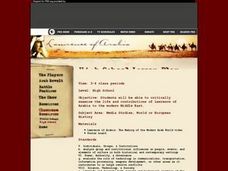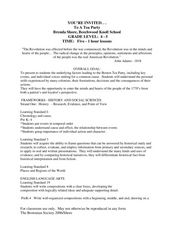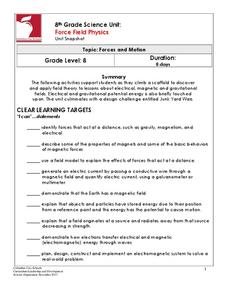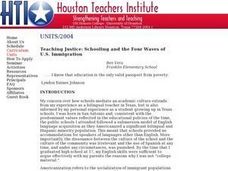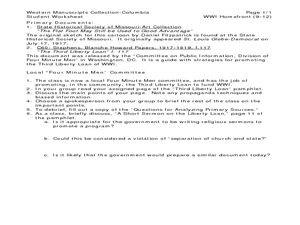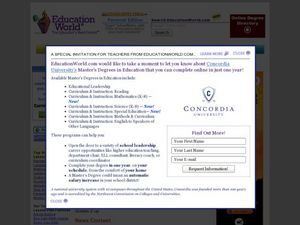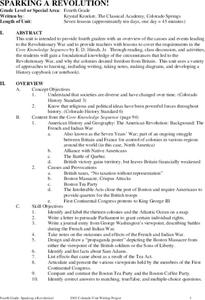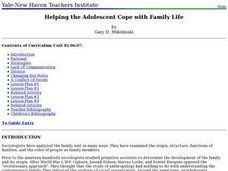Curated OER
What is War?
Students establish what war signifies to them. They demonstrate this by voting on statements. Students are invited to ponder about how they feel about issues, their world history, and to defend their positions.
Curated OER
Laurence of Arabia
Students critically examine the life and contributions of Lawrence of Arabia to the modern Middle East. They view a video on Laurence of Arabia. Students discuss the movie. Students create a propaganda posters or stories identifying...
Curated OER
Why War? Causes of the American Revolution and South Carolina's Role
Eighth graders investigate the role of South Carolina in the American Revolution. In this colonial American lesson, 8th graders analyze primary documents and images to determine how the state was involved in the outbreak of the war and...
Curated OER
The American Home Front During WWII
Students analyze World War Two era government propaganda, biographies, and historical data in order to better understand the effects on Americans at home. In this American Home Front During World War Two lesson, students compare...
Curated OER
The Westward Movement
Students study the westward movement through examining stamps. In this westward movement lesson plan, students draw conclusions, determine cause and effect relationships and examine the westward movement of the United States by...
Curated OER
The Crusades
Students investigate the series of religious wars known as the Crusades. In this Crusades lesson, students research Christian and Muslim beliefs and create posters that compare the two. Students discuss the causes of the wars as well as...
Curated OER
You're Invited...To A Tea Party
Kids read the book Boston Tea Party by Steven Kroll and use maps to locate various landmarks. They identify the cause and effect of the events related to the Boston Tea Party, then write a descriptive composition.
K12 Reader
Churchill's Speech: We Shall Fight on the Beaches
Winston Churchill speech delivered to the House of Commons on June 4, 1940, is the focus of a comprehension exercise that asks readers to explain how the repetition in the speech supports the main purpose of Churchill's address.
Curated OER
Portraits of History
Eighth graders research the Post-Revolution to Pre-Civil War era by investigating the life and contributions of a notable person. They create silhouettes which are framed with timeline. Also, they add the research information to the...
Columbus City Schools
Force Field Physics
Attracted class members to an activity-packed journey through the science behind the invisible forces at work all around us. From jump rope generators to junkyard wars, there's never a dull moment when eighth grade physics scholars...
Curated OER
Teaching Justice: Schooling and the Four Waves of U.S. Immigration
U.S. immigration is the focus of a unit on social justice. Over the course of a school year, young historians read a variety of texts to learn about four waves of immigration that have occurred over time in the U.S. An emphasis on...
Curated OER
Local Four Minute Men Committee
Learners research the "Third Liberty Loan" pamphlet. In this discussion lesson plan, students read the pamphlet and discuss their opinions. Learners answer questions and discuss main points of the document.
Curated OER
The Ethics of the Bomb: What Would You Do?
Learners research the use of the atomic bomb in WWII, analyze the human costs of dropping the bomb and identify the pros and cons. They develop a PowerPoint presentation on the effects of an atomic bomb dropped on their hometown.
Curated OER
Baby Boom and the Culture of the 1950's
Eleventh graders explain the causes, course, and consequences of the United States' role in World War II.
Curated OER
American Revolution Simulation
Young scholars explore the grievances of the American colonists. They relate to that which is held most dearly i.e. life, liberty and the pursuit of happiness.
Curated OER
Jamestown Celebrates 400th Anniversary
Students view a world map and identify the locations of England and Virginia and discuss what kinds of things they would take with them on this kind of trip. They read the words in the news box on the student page and fill in the blanks...
Curated OER
City Bound
Fifth graders identify the reasons for people migrating to cities after the Civil War. Using population data, they discover why populations in cities rose while rural populations fell during 1860 to 1900. They discuss the impact a...
Curated OER
Pocumtucks In Deerfield
Students read a story about the Pocumtucks' religious beliefs. Using the text, they discover their concept of land ownership and how they migrated within their territory in different seasons. They use primary and secondary sources to...
Curated OER
Sparking a Revolution!
Students investigate the causes and events that lead to the US Revolutionary War. They use a number of study techniques in this unit to discuss why the colonies wanted freedom from Britain.
Curated OER
Imperialism and Expansion: Part 1
Students explore the era of imperialism and expansion of the United States. In this American history lesson, students play a game regarding the U.S. attempts to expand the nation in the late 1800s and early 1900s.
Curated OER
The Great Depression
Students analyze the causes of the Great Depression. In this Great Depression lesson, students listen to their instructor present lectures regarding the Dust Bowl, stock market crash, and Smoot-Hawley Tariff Act. Students conduct further...
Curated OER
The Civil War
Eleventh graders study selected prints and/or photos and consider how Americans of the 19th century chose to present themselves to other Americans and the world by means of visual images. They share their observations and opinions.
Curated OER
The Star-Spangled Banner
Students explore the Star-Spangled Banner. In this civics lesson, students read the lyrics of the song as well as a handout that details its creation. Students respond to discussion questions from the handout.
Curated OER
Helping the Adolescent Cope with Family Life
Young scholars are introduced to the proper ways to deal with conflict at home. In groups, they define family based on what it means to them and identify factors that lead to a breakdown in communications. They participate in...



